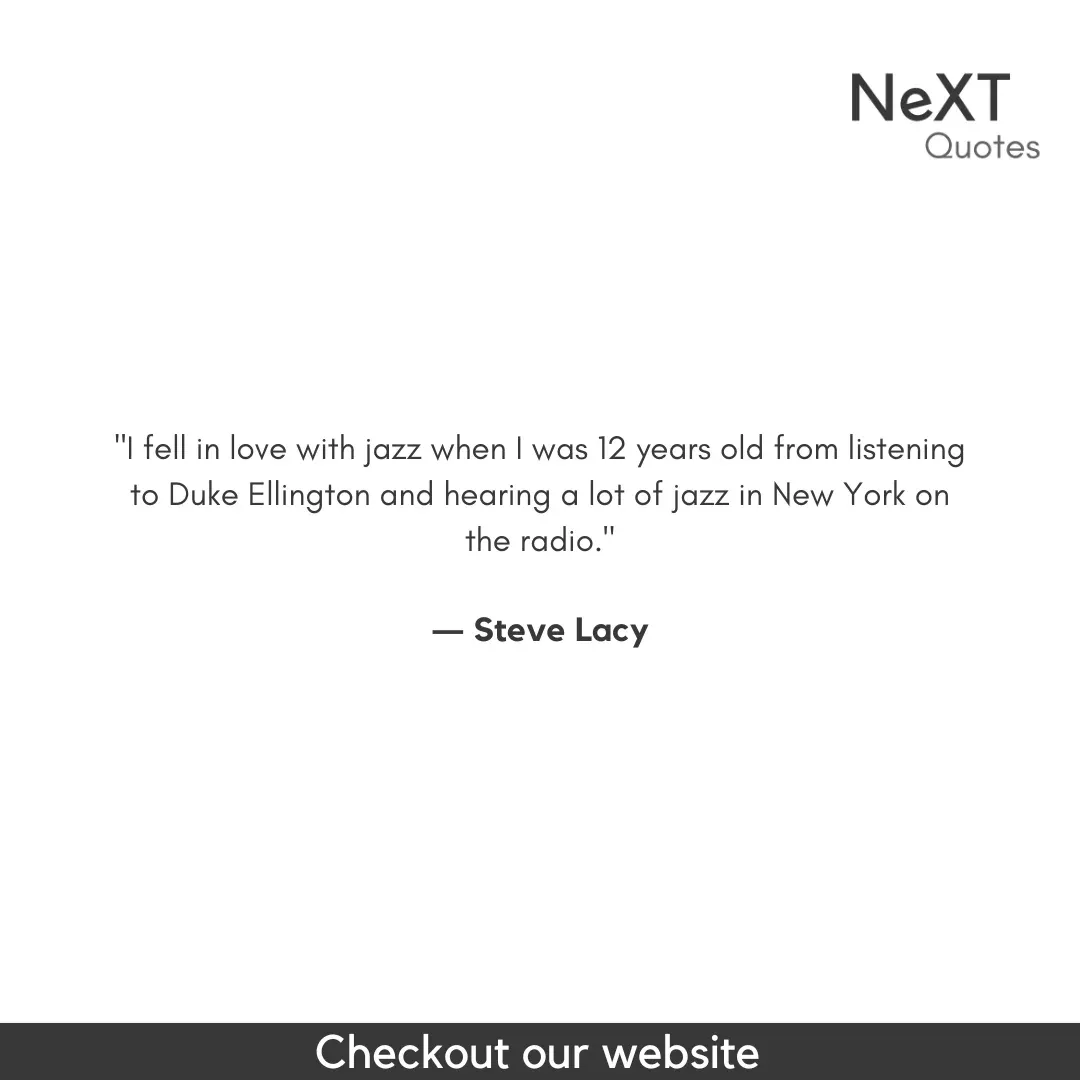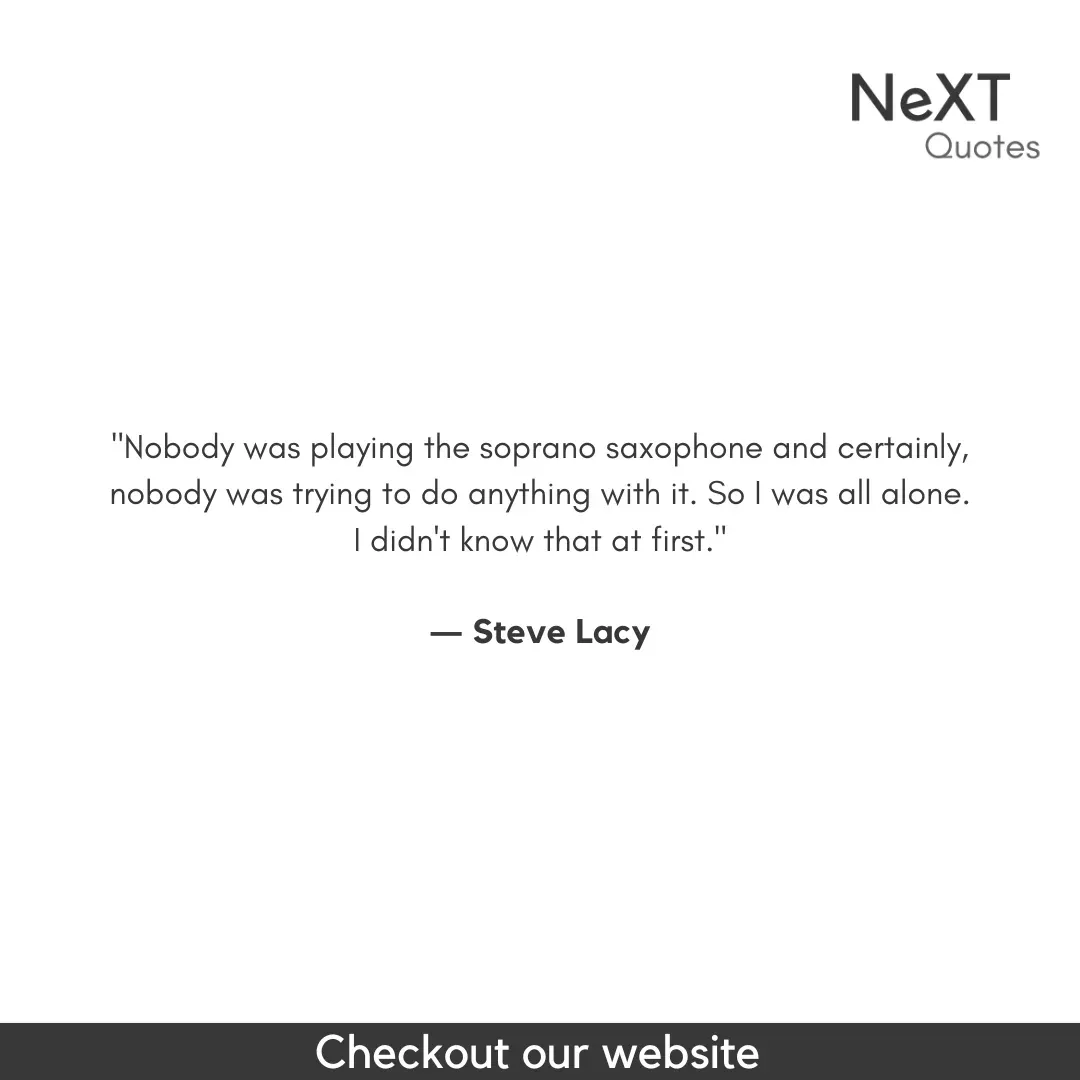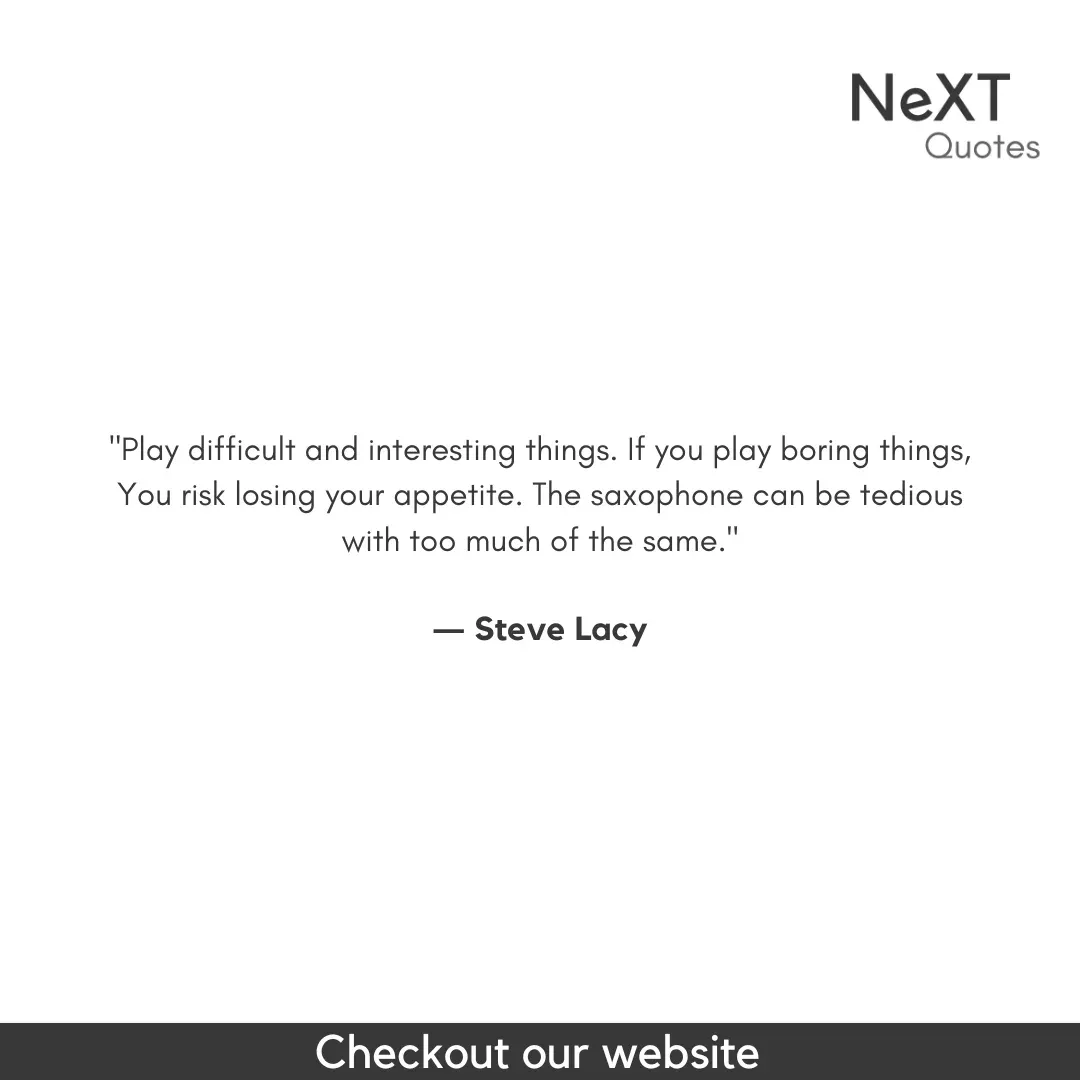
Steve Lacy is a talented musician and producer known for his soulful sound and unique approach to music. From his early work with the band The Internet to his solo projects, he showcases his musical versatility and has become a rising star in the industry.
1) Jazz is like wine. When it is new, it is only for the experts, but when it gets older, everybody wants it.
Jazz, like wine, may seem complex at first, appreciated mainly by experts. But as time passes, its beauty and appeal grow, captivating people from all walks of life, making it a cherished and sought-after genre of music.
2) Saxophone is one thing, and music is another.
The saxophone is a musical instrument known for its smooth and soulful sound. While the saxophone is just a tool, music is the art created through it—expressing emotions, telling stories, and bringing joy to people's lives.
3) Whoever has an original thing to say, is sort of a threat to the status quo.
Someone who has unique and fresh ideas is seen as a challenge to the way things are normally done. Their originality disrupts the established order, making them a potential threat to those who prefer things to stay the same.
4) It's very important to go through periods where you sound just rotten and you know it, and you have to persevere or give up.
It's crucial to experience times when you feel really awful about something and are aware of it. In those moments, you must keep going despite the struggle or make the choice to quit. These periods of growth build resilience and determination.
5) I think it is in a collaboration that the nature of art is revealed.
When artists work together, the true essence of art emerges. Collaborations allow different perspectives and talents to intertwine, creating something unique and inspiring. It's through these partnerships that the beauty and power of art shine brightest.
6) Before the work comes to you, you have to invent work.
To get work opportunities, you must create them yourself. It means being proactive, finding ways to showcase your skills, and seeking out new challenges. Don't wait for work to come to you—go out and invent it!
7) I've been working on the soprano saxophone for 40 years, and the possibilities are astounding. It's up to you, the only limit is the imagination.
For four decades, I've dedicated myself to mastering the soprano saxophone, and its potential is mind-blowing. Your imagination is the only boundary. The instrument offers endless possibilities, allowing you to create truly remarkable music.
8) People don't want to suffer. They want to sound good immediately, and this is one of the biggest problems in the world.
Many people avoid suffering and seek instant gratification. This desire for immediate satisfaction is a major global issue. We often prioritize short-term comfort over long-term solutions, hindering personal growth and societal progress.
9) You have to sound sad first of all, then maybe later you can sound good.
To create an emotional impact in music or storytelling, it's important to express sadness initially. Once that connection is made, you can transition into more uplifting or enjoyable tones, leaving a lasting impression on the listener or audience.
10) Bamboo is not a weed, it's a flowering plant. Bamboo is a magnificent plant.
Contrary to popular belief, bamboo is not a weed but a beautiful flowering plant. It is incredibly versatile and has numerous uses, from furniture and flooring to eco-friendly construction. Its fast growth and strength make it truly magnificent in the plant kingdom.
11) I still love the whole history of jazz. The old things sound better than ever.
Jazz is a captivating genre with a rich history. The classic jazz tunes continue to enchant listeners, offering a timeless and magical experience. The music has a special quality that keeps getting more delightful with age, making it a cherished part of musical heritage.
12) Risk is at the heart of jazz. Every note we play is a risk.
In jazz, risk-taking is essential. Every musical note we play carries uncertainty, like a leap of faith. It's the fearless exploration of improvisation that gives jazz its soulful and thrilling essence, captivating listeners with its unpredictable and daring nature.
13) I was spoiled by Monk's music because it was so good, so complete.
Monk's music was incredible and had a profound impact on me. It was exceptionally well-crafted and satisfying to listen to. It spoiled me because it set such a high standard for musical excellence and completeness.
14) The potential for the saxophone is unlimited.
The saxophone holds endless possibilities for creativity and expression. With its unique sound and versatility, it can captivate listeners in jazz, classical, or even pop music. From soulful melodies to energetic solos, the saxophone knows no bounds in its potential.
15) It starts with a single sound. If there's something in that sound, then it's worth continuing.
A single sound holds the potential for greatness. If it captures our attention, resonates with us, or stirs something inside, it's worth exploring further. It's the spark that ignites creativity and leads to something meaningful.
16) Jazz is people's music, a collectivity.
Jazz is a genre of music that belongs to the people. It thrives on collaboration and the collective creativity of musicians. Its free-flowing nature allows individuals to express themselves while creating a harmonious and soulful sound that resonates with listeners.
17) You must have the music to justify an instrument's extensive use.
Music is the key to truly appreciating and making the most of playing an instrument. It's the magic ingredient that brings life and purpose to all the hours of practice, making the instrument truly worthwhile.
18) You can work on the saxophone alone, but ultimately you must perform with others.
Playing the saxophone can be a solo endeavor, but to truly shine, you need to collaborate with other musicians. Just like in life, working together creates harmonies that elevate the music and make it truly magical.
19) Circumstances can be very important. Find the right people to work with.
The circumstances surrounding a situation can greatly impact its outcome. It's crucial to surround yourself with the right people, those who share your vision and can contribute positively to your work. Collaborating with the right individuals can lead to success and fulfillment.
20) If you're trying to invent something new, you're going to reach a lot of discouraging points, and most people give up.
When creating something new, you'll face many moments of doubt and obstacles that may make you want to quit. But the ones who succeed are the ones who keep going despite the challenges, pushing through to make their inventions a reality.
21) The saxophone is a very interesting machine, but I'm more interested in music.
The saxophone is a fascinating instrument known for its unique sound. While it's intriguing, my true passion lies in the music itself. It's the melodies, rhythms, and emotions that capture my heart, regardless of the instrument involved.
22) When I came up, it was all about originality and collective research. There is an awful lot of imitation going on now.
Back in the day, being unique and exploring new ideas was valued. Nowadays, there's too much copying happening. It's important to keep pushing boundaries and doing our own research to create something fresh and exciting. Let's bring back originality!
23) If you have music you want to play that no one asks you to play, you have to go out and find where you can play it. It's called do or die.
If there's music you love and want to play, but nobody asks you to, you must go find places where you can share it. It's a "do or die" situation, meaning you have to take action and make it happen.
24) I heard Sidney Bechet play a Duke Ellington piece and fell in love with the soprano saxophone.
One day, I listened to Sidney Bechet playing a beautiful Duke Ellington song on the soprano saxophone, and it instantly captured my heart. I fell in love with the sweet and enchanting sound of that instrument.
25) If you listen to Louis Armstrong from 1929, you will never hear anything better than that really, and you will never hear anything freer than that.
If you listen to Louis Armstrong's music from 1929, you'll experience something extraordinary. His sound is unbeatable, and it's filled with a sense of freedom that's hard to find elsewhere. It's a truly remarkable and liberating experience.
26) The soprano has all those other instruments in it. It's got the soprano song voice, flute, violin, clarinet, and tenor elements and can even approach the baritone in intensity.
The soprano voice is like a super instrument! It combines the beautiful sounds of a song, flute, violin, clarinet, and tenor. It can even reach the power of a baritone sometimes. It's like having a whole orchestra in one voice!
27) I fell in love with jazz when I was 12 years old from listening to Duke Ellington and hearing a lot of jazz in New York on the radio.
When I was 12, I discovered jazz and instantly fell in love with it. Duke Ellington's music and the jazz played on New York radio captivated me, and I couldn't get enough of the unique and soulful sound.
28) I started in New Orleans music and played all through the history of jazz.
I began my musical journey in New Orleans, where the lively sounds of jazz filled the air. From its early roots to its rich history, I've been fortunate to play and experience the diverse and captivating world of jazz music.
29) I wanted to be a pianist but it just wasn't my thing. I guess I wanted to stand up rather than sit down.
I dreamt of being a pianist, but it didn't suit me. I preferred standing up instead of sitting down. Sometimes our passions take unexpected turns, and that's okay. It's important to find what truly feels right for us.
30) I've always been extremely lucky in playing with great people who knew much more than I did. That's how I got from there to here.
I've been fortunate to play with talented people who knew more than me. It's thanks to them that I've reached where I am today. Surrounding myself with knowledgeable individuals has helped me grow and succeed.
31) I've performed solo for 20 years now, but I don't do much of it, because if you only play alone, you go crazy and out of tune and play foolish music.
For the past 20 years, I've been performing alone, but I don't do it too often. If you only play by yourself, you can become crazy and make mistakes. It's important to collaborate with others and play meaningful music.
32) Kenny G, I have to be grateful to him for proving that the instrument can be played in all different kinds of ways.
Kenny G deserves gratitude for showing us that the same instrument can be played in many unique ways. He expanded our understanding of its possibilities and inspired others to explore new styles and techniques.
33) Nobody was playing the soprano saxophone and certainly, nobody was trying to do anything with it. So I was all alone. I didn't know that at first.
When I started playing the soprano saxophone, no one else was playing it or even interested in it. I felt alone, but I didn't realize it at first.
34) Play difficult and interesting things. If you play boring things, you risk losing your appetite. The saxophone can be tedious with too much of the same.
When you play challenging and exciting music, it keeps you interested and motivated. If you stick to dull and repetitive tunes, you might lose your passion. The saxophone, for example, can become monotonous without variety.
35) Register is very important. Music sounds best in a certain register.
The register is like the special zone where music sounds its best. Just like a singer hitting high or low notes, different instruments have their sweet spot for creating beautiful melodies that make our ears happy.
36) Some people really want to play Mozart and be just performers. I was more interested in invention.
While some aspire to perform Mozart's music, I was drawn to creating something new. I found joy in the process of invention rather than solely being a performer.
37) The more original something is, the more of a threat it seems until the people catch up with it. That happened with Thelonious Monk. It happened with anybody who is really original.
When something is very unique and different, it can feel scary to people until they understand and appreciate it. This was true for Thelonious Monk and any other truly original person.
38) The soprano turned out to sound to me like the right hand on the piano.
When I listened to the soprano, it reminded me of the piano's right hand. It seemed to match in tone or melody, creating a harmonious and beautiful sound that complemented each other.
39) There is an awful lot of what I call recreational jazz going on, where people go out and learn a particular language or style and become real sharks on somebody else's language.
There's a lot of "recreational jazz" happening, where people learn a language or style just for fun, becoming really good at imitating someone else's way of speaking.
40) They call me before they go into production when they have a prototype, and they call legitimate saxophonists, too. As opposed to the other kind.
When companies create new products, they reach out to me and other real saxophonists for feedback on their prototypes. They want input from professionals like us, not just anyone who claims to play the saxophone.
41) To me, there is a spirit in a reed. It's a living thing, a weed, really, and it does contain a spirit of a sort. It's really an ancient vibration.
For me, a reed has a special energy. It's a living plant, like a weed, but it carries a unique spirit within it. It holds an ancient vibration, something magical that connects us to the past.
42) We played for peanuts. But we did what we wanted to do, we heard what we wanted to hear, we performed what we wanted to perform, and we learned what we wanted to learn.
We played for peanuts, but it was worth it. We followed our hearts, listened to what inspired us, showed our talents, and gained knowledge that mattered to us. We lived life on our terms.
43) What I learned with Cecil Taylor was strategy and survival and how to resist temptations and resist getting discouraged.
Cecil Taylor taught me important lessons about strategy, survival, and staying strong. I learned how to resist temptations and not let setbacks bring me down. These skills helped me navigate challenges and keep moving forward.
44) When I first started playing music in 1955, there was just a small body of people that knew it. It was a very esoteric type of thing.
Back in 1955, when I began playing music, only a few people knew about it. It was like a secret, not well-known by many. It felt special and mysterious, like a secret club.
45) When I found the music of Monk I finally found music that fit that horn. Every one of his tunes fits it perfectly.
When I discovered Monk's music, I realized it was a perfect match for my instrument. Each of his songs was just right for my horn, creating a harmonious blend that felt amazing to play.
46) When I heard Monk in person in 1955, he was playing with a quartet in a small club. The place was full of musicians, but there was no public at all.
In 1955, I saw Monk perform live in a cozy club. It was packed with musicians, but there were no regular people in the audience. It was a unique experience to witness such talent in an intimate setting.
Thank you for seeing this post.



















































